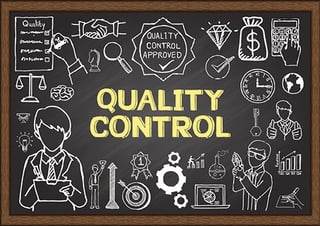 There are many theories for work strategy which claim to unlock the door to a better way of doing business, but how many of them really ring true when put into practice? One philosophy which has attracted many devotees, including in the manufacturing world, is Total Quality Management (TQM): a set of principles which is proven to give companies a step up when it comes to the quality of their output.
There are many theories for work strategy which claim to unlock the door to a better way of doing business, but how many of them really ring true when put into practice? One philosophy which has attracted many devotees, including in the manufacturing world, is Total Quality Management (TQM): a set of principles which is proven to give companies a step up when it comes to the quality of their output.
Made for ERP
When applying the practicalities of a business philosophy, many companies struggle. Luckily there is a range of Enterprise Resource Planning (ERP) software on the market today - such as WinMan - at our disposal. ERP software provides many of the tools needed for manufacturers to implement TQM based strategies at a practical level.
The five principles
First let's lay out the five main principles of TQM, which are:
- Produce quality work the first time - quality should be built into business processes and measures are in place to ensure the quality of the process.
- Focus on the customer - the product or service on offer must meet or exceed the customer expectation.
- Have a strategic approach to improvement - processes should be carefully developed and tested to ensure quality.
- Improve continuously – a system in place to analyse business performance and processes to reveal whether there is a more effective and productive way of carrying out certain tasks.
- Encourage mutual respect and teamwork – promote a healthy organisational culture, where teamwork is essential.
Applying TQM with ERP
The first principle of producing quality work first time can certainly benefit from ERP. Using the software, we can assess processes to see what can be automated and this can save time and decrease the risk of error across the board. Then we have the second principle: 'focus on the customer' - this requirement ties in perfectly with the built-in customer relationship management (CRM) capabilities of the leading ERP systems, allowing customer and prospects interaction to be logged, marketing campaigns to be created and customer-facing processes refined continually to offer a better experience.
Then there is the third principle, which is concerned with improving in a strategic manner. Supply chain management is an apt example of how manufacturers can use ERP to collate information on an ongoing basis, analyse their data and then take steps to improve their processes. From production to financial management, CRM, planning and scheduling and project management, it takes many different elements working in sync to carry out the fourth principle - improve continuously - in practice. Finally, for the fifth principle, ERP systems can encourage teamwork, as different departments can work from the same business system, helping to improve communication and the consolidation of business data.
Thankfully continuous improvement tools for all those different facets of a business and many more besides them, are provided in the best ERP software, meaning it really can be the saviour of those determined to reap the benefits of the TQM approach.
TQM as a template for the future
TQM is far from a new phenomenon - as far back as 1992, a study which quizzed over 500 large US firms found that 93% of them were using TQM influenced practices in some way, shape or form. But it seems like manufacturers have never had a better way of exploiting the principles of TQM than they have right now. That's because ERP manufacturing software addresses the vast majority of principles laid out by the philosophy and allows us to execute them, analyse their progress and then continually measure the effectiveness of changes we make with continuous improvement techniques in order to make sure we are constantly ticking the boxes of TQM principles.



.png?width=120&height=120&name=MicrosoftTeams-image%20(4).png)


